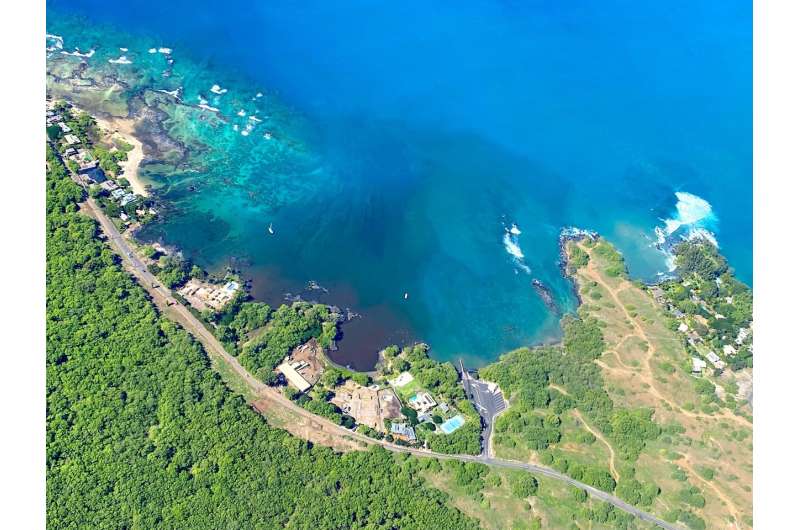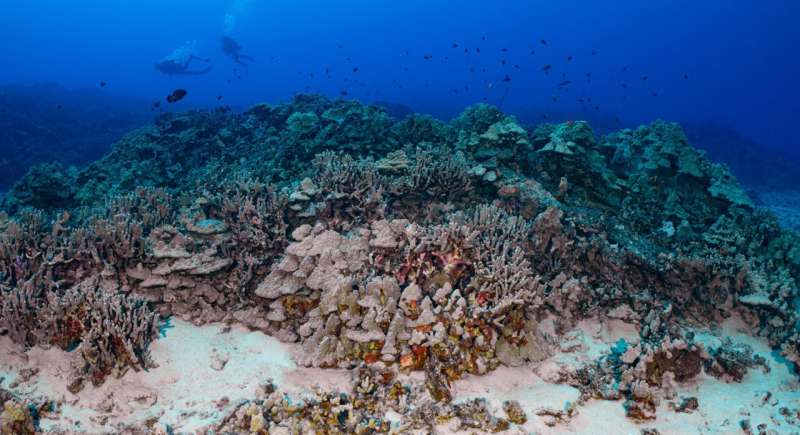This article has been reviewed according to Science X's editorial process and policies. Editors have highlighted the following attributes while ensuring the content's credibility:
fact-checked
peer-reviewed publication
trusted source
proofread
New research confirms land–sea relationship is a major driver of coral reef health outcomes

Climate change has long been considered as one of the greatest drivers of declining coral reefs, but the specifics of human impact have been largely unverified. In a new paper published in Nature, researchers tracked coral reef health in Hawaiʻi for 20 years—measuring increasing water acidification, land-based pollution, repercussions from a major climate event and rising water temperatures—and illustrated the undeniable contributions of human impact on coral reef health outcomes.
New research by Arizona State University, the National Oceanic and Atmospheric Administration's Pacific Islands Fisheries Science Center (PIFSC) and Bangor University in the U.K. indicates that mitigating both local land and sea-based human impacts, especially in terms of pollutants and over-fishing, provides coral reef ecosystems with the best opportunity to persist under climate change. Along some highly populated areas on the shorelines of Hawaiʻi, wastewater pollution and urban runoff combine with fishing pressures to put immense stress on coral reefs.
The paper, "Coral reefs benefit from reduced land-sea impacts under ocean warming," was published in Nature on August 9.
"There is a very strong perception that declining reef heath is mainly driven by climate change, which is true in the long term. However, what we are putting in our waters from our shores, as well as the amount of fishing we are doing, are huge drivers that are more immediately actionable," said Greg Asner, senior author of the study and director of ASU's Center for Global Discovery and Conservation Science. Asner said the 20-year time frame provided a unique opportunity to reflect on solution strategies.
These human-caused threats were most clearly demonstrated to have significant impact in 2015, when the Hawaiian Islands experienced the strongest marine heat wave on record over the past 120 years.
"The 2015 marine heat wave in Hawaiʻi was unprecedented: nothing comes close in well over a century of recorded temperature data," said Jamison Gove, a research oceanographer with PIFSC and co-lead of the study. "As a consequence, many reefs in our study region experienced severe bleaching and extensive coral death. But to our surprise, we found that coral cover was unchanged at nearly 20% of reefs in our study. Which begs the question: why did some reefs fare better than others despite experiencing similarly extreme levels of heat stress?"
Local land-sea conditions were the difference: the reefs that had less coral loss from the heat wave were the same reefs with the lowest levels of land-based stressors and increased fish populations. Asner said land-sea relationships are an area that can be greatly affected by policy efforts.
"We are deeply embedded with county, state and federal governments and working to try to resolve these issues," said Asner, also a senior global futures scientist with the Julie Ann Wrigley Global Futures Laboratory at ASU. "Each of these governments can tackle a different tier of the problem, from wastewater issues to overarching climate change. Some of these issues will take longer to mitigate but some can see positive change now—wastewater issues can sometimes come down to individual buildings and houses."

Wastewater pollution contains a high concentration of nutrients, toxins and pathogens that are known to increase coral disease and decrease growth and reproduction. Asner said septic tanks and cesspools, both common in Hawaiʻi, can be especially harmful to coral reefs.
Gareth Williams, associate professor at Bangor University and co-lead of the study, said the long-term research done through this study supports the theory that the land-sea relationship is an especially important element in coral reef protection.
"Integrated land-sea management has been the guiding paradigm of coral reef conservation for decades, but the proof of its efficacy above managing land or sea in isolation has been wanting and difficult to test," Williams said. "Through the 20-year data set of local human impacts and environmental factors, we are able to see that only by adopting coupled land-sea policy measures, alongside global reductions in greenhouse gas emissions, will coral reef ecosystems and the human communities they support have the best opportunity for persistence in our changing climate."
More information: Jamison Gove, Coral reefs benefit from reduced land-sea impacts under ocean warming, Nature (2023). DOI: 10.1038/s41586-023-06394-w. www.nature.com/articles/s41586-023-06394-w
Journal information: Nature
Provided by Arizona State University




















